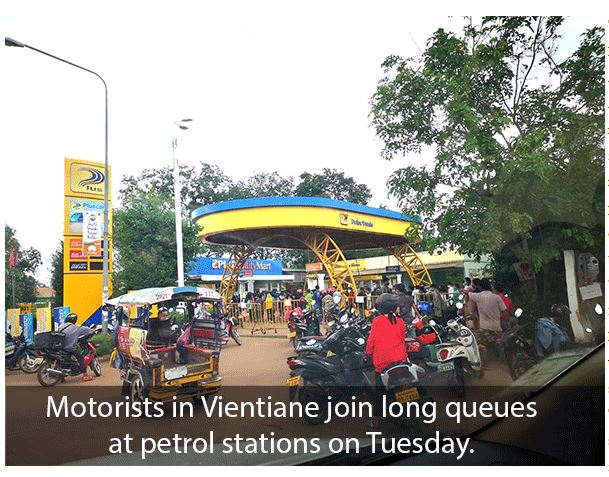Laos: Fuel shortage worsens
Long queues formed at petrol stations across the capital on Tuesday as desperate motorists drove from place to place in a determined attempt to find fuel.
Provinces across the country have been suffering shortages for weeks, with early warning signs as Luang Namtha ran out of fuel in late March. The situation worsened in Pakxe city and Savannakhet province, before finally hitting Vientiane yesterday afternoon.
The fuel shortage has occurred due to the depreciating value of the kip, with the Thai baht and US dollar becoming increasingly expensive.
This has meant that many importers have been unable to buy more fuel.
A member of the Lao Fuel and Gas Association who asked not to be named said fuel businesses and importers have been struggling for months to supply enough fuel to meet public demand due to fluctuating currency exchange rates and the volatile global oil market.
“We can’t take risks with our precious financial resources. Some businesses have stopped importing fuel because they are unable to make a profit,” he said.
The government will have to make some policy changes around fuel imports and modify management of the process, as well as tackling the unfavourable currency exchange rate, which is the root cause of the problem, he added.
Laos is totally dependent on fuel obtained from outside sources. In an attempt to rectify the situation, the government is considering lowering taxes and other fees paid by fuel businesses to lower the retail price of fuel. It may be necessary to set up an Oil Fund to help cap oil prices, the businessman said.
Prime Minister’s Office issued a notice on May 9, ordering concerned sectors to implement the Resolution of the Standing Committee of the National Assembly.
According to the notice, the excise tax charged on diesel will be lowered from the current amount of 21 percent to 11 percent while the excise tax charged on gasoline will be cut from 31 percent to 16 percent, to help lower the retail price.
This will enable fuel businesses and importers to get some relief from the impact of high oil prices on the cost of transport and consumer goods.
The cut in taxes will also ease the burden on the public. It is also hoped that reduced operating costs for business operators will be passed on to consumers.
The government needs to be able to garner revenue from other sources to offset the reduction in revenue earned from the excise tax on fuel.
Oil output has failed to keep pace with rising demand by countries pursuing economic recovery following the Covid-19 pandemic, while the ongoing conflict between Russia and Ukraine has exacerbated the situation.
Source: https://www.vientianetimes.org.la/freeContent/FreeConten88_Fuel.php


 English
English




